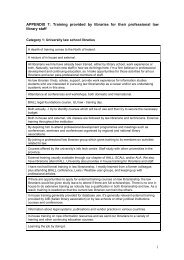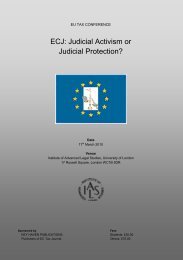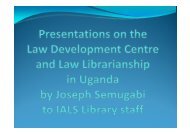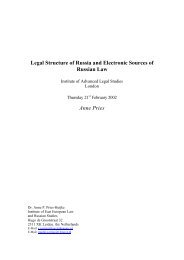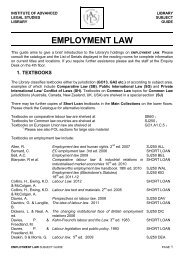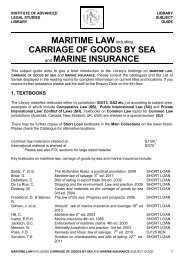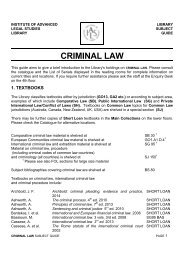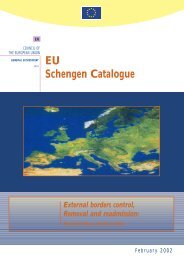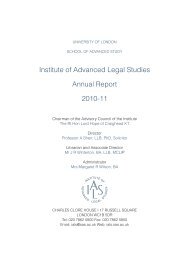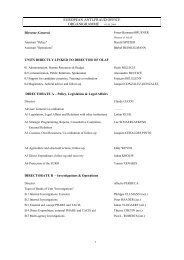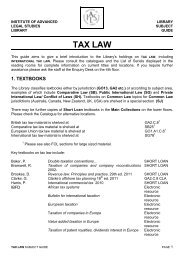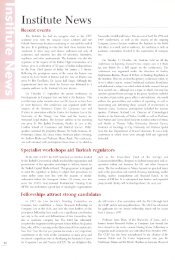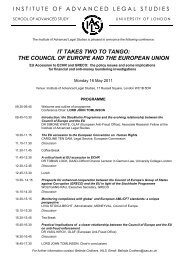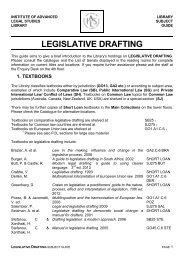a thesis - Institute of Advanced Legal Studies
a thesis - Institute of Advanced Legal Studies
a thesis - Institute of Advanced Legal Studies
Create successful ePaper yourself
Turn your PDF publications into a flip-book with our unique Google optimized e-Paper software.
48 EXPRESS TRUSTS.<br />
Bink* (1850, 15 Q. B. 713), for example, it was expressly decided<br />
that the trust became binding when the assignment was communicated<br />
to the creditors, and they expressed themselves " satisfied " and<br />
took no steps to enforce their claims. Again, in Si/nnot v. Simpson<br />
(1854,5H.L.dat p. 138), Lord Gran worth said: " If the debtor has<br />
notice given him [sic—qy., has given him (i.e., the creditor) notice]<br />
<strong>of</strong> the existence <strong>of</strong> the deed, and has expressly or impliedly told him<br />
he may look to the trust property for payment <strong>of</strong> his demand, the<br />
creditor may thereby become a cestui que trust." In Cosser v.<br />
Radford (1863, 1 De G. J. & S. 585), it was said by Turner, L. J.,<br />
that " if the creditors act upon the deed it becomes binding"; but<br />
there the creditor had, as a matter <strong>of</strong> fact, executed the deed;<br />
and in Johns v. James (1878, 8 Ch. D. 744), James, L. J., said:<br />
" If the creditor has executed the deed himself, and been a party<br />
to it and assented to it—if he has entered into obligations on the<br />
faith <strong>of</strong> the deed, <strong>of</strong> course that gives him a right." But it appears<br />
from Comthwaite v. Frith (1851, 4 De G. & Sm. 552) that it must<br />
be clearly proved that the trust has been communicated; mere<br />
communications by the trustee with the creditors about their claims<br />
was held insufficient to entitle them to a decree for the execution<br />
<strong>of</strong> the trust.<br />
Exactly what must be the nature <strong>of</strong> the communication with<br />
creditors in order to prevent the deed being revocable seems, then,<br />
not to be quite clear.<br />
It does not seem to matter whether the communication is made<br />
by the settlor or the trustee. In Synnot v. Simpson (supra), Lord<br />
Cranworth spoke <strong>of</strong> communication by the debtor being sufficient;<br />
while in Harland v. Binks (1850, 15 Q. B. 713), it was held that<br />
communication by the trustee was sufficient. (See also Griffith v.<br />
Ricketts, supra.}<br />
Again, it does not seem necessary that the assent <strong>of</strong> the<br />
creditors should be an express one. If the creditor incurs obligations<br />
on the faith <strong>of</strong> the deed it becomes binding, according to<br />
James, L. J., in Johns v. James (supra).<br />
Whether a sufficient communication <strong>of</strong> the deed to some only<br />
<strong>of</strong> the creditors renders it irrevocable as to all cannot be gathered<br />
from the cases, but, having regard to the cases as to the effect <strong>of</strong><br />
execution by some only <strong>of</strong> the creditors (SGQ supra), it is submitted<br />
that it would not.



